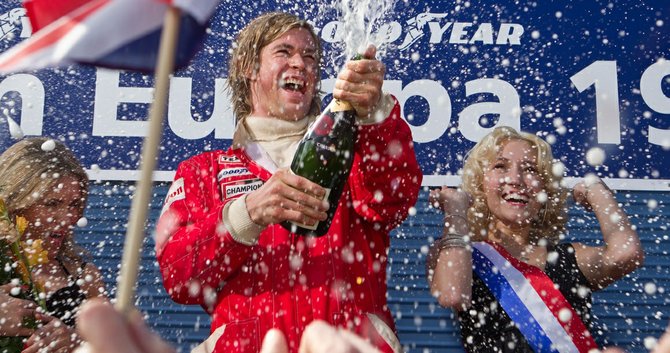Chris Hemsworth plays a Formula 1 racecar driver in Ron Howard’s “Rush.” Photo by Courtesy Universal Pictures
"Rush," Ron Howard's biopic on the 1976 Formula 1 race season and the rivalry between two rich boy-men, brought back memories of kicking back on Saturday afternoons and watching ABC's "Wide World of Sports." Howard captures the adrenaline rush of low-slung cars droning like angry wasps around the track. The drivers blur behind high speed, big wheels, fancy carcasses in bright hues and snug-fitting helmets.
Who were these fast boys of grand prix racing? What type of person squeezes into the pit of a tiny trap of a car and waits for the steering wheel to be bolted in? I never thought much about the drivers who sought the thrill of victory and the agony of defeat—that is, until this film, which wasn't on my list of must-sees. I saw it only because I walked out of "Don Jon," a trussed-up porn film faking as a rom-com. Even with the movie pedigree making "Rush," I had no desire to see a "true story" of fast and furious.
Screenwriter Peter Morgan has developed a unique niche of spinning real-life stories into memorable films, such as "The Queen," "Frost/Nixon," and "The Last King of Scotland." In "Rush," Morgan provides a character study on two men who pursue the same sport in the bicentennial year of this country. His script is far better than the subject matter.
James Hunt (Chris Hemsworth) is a wealthy British playboy. Hunt possesses raw talent on the track, but he's undisciplined, a hedonist gorging on sexy women, booze and late-night debauchery, and then racing during the day for the simple reason that he can afford it. It comes as no surprise that Hunt has a hard time finding a sponsor. He's described in racing circles as "a loose cannon," but he puts on a good show, and he's telegenic. He also has a disastrously bad marriage to model Suzy Miller (Olivia Wilde), who dumps him for Richard Burton. Possibly because it would irrevocably taint anything remotely likeable about Hunt, Howard and Morgan do not explore the tabloid story of Hunt selling Miller to Burton for a $1 million in alimony. The bottom line is that Hunt sells tickets. He's good for the sport, because he's ballsy, brash and Thor-ishly beautiful.
Hunt's game-changing rival is Austrian Niki Lauda (Daniel Bruehl), another rich young guy. Lauda lacks Hunt's charm and good looks and speaks with the conviction of artificial intelligence. Lauda analyzes life and racing in terms of risks and benefits.
"I will take a 20 percent risk of death," he says.
Lauda knows the ins and outs of his craft. He understands cars and racing—and did I mention that he is very disciplined? On his honeymoon, Lauda tells his wife Marlene (Alexandra Maria Lara) that "happiness is the enemy." He only wants to win, even if he must be unhappy, but only if the odds are statistically acceptable.
The conceit of this movie is that these men are different. They are not. They both love to roll the dice of death. Their happiness rides on the edge of "here today, gone tomorrow." And they are competitive to a bitter fault. Forty-two days after surviving a searing inferno of an 800-degree crash and burn, Lauda returns to racing. He tells Hunt that he found the will to live because his single purpose was to beat Hunt.
Howard infuses the film with adrenaline-charged car races, which is likely to please all fans of Formula 1, NASCAR, "Talladega Nights," Indy 500 and more. The actors do a fine job, at times even channeling the real drivers, whose visages we see at the end.
But who really cares about these two selfish guys? It's a race. You win. You lose. You live. You die. That's the thrill of victory and the agony of defeat. Don't expect "Chariots of Fire." There's nothing about the film's nominal subjects that make a larger statement about human nature.



Comments
Use the comment form below to begin a discussion about this content.
comments powered by Disqus